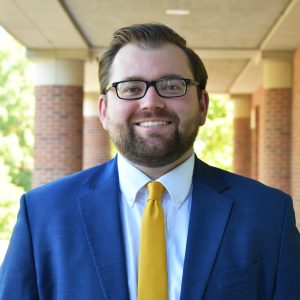Published on
Updated on

by Tanner O’Neal Riley
When it comes to underdog stories, people often think of mismatches: the tortoise versus the hare, Rocky versus Apollo Creed, or Mizzou versus Kansas basketball this past December. These are the stories where the odds lean heavily in one direction until the right person, with the right amount of determination, changes everything.
Bailey Barnes, a first-year law professor at Mizzou Law and a civil rights scholar, is one of those people.
“I don’t like bullies. That probably comes from being from small-town Appalachia—scrappy,” Barnes said. “When it’s government agents harming people in the government’s name, that’s a David versus Goliath story, and that appeals to me.”
A native of McMinnville, Tennessee—the nursery capital of the world—Barnes is the son of a farmer who owns his own nursery and a public-school teacher. He earned a bachelor’s degree in political science from Tennessee Tech University and a master’s degree in history from Middle Tennessee State University. He later graduated summa cum laude and Order of the Coif from the University of Tennessee College of Law.
Barnes credits his background in history with helping shape how he approaches the law. “When I look at a statute or constitutional provision, I like to ask, ‘What was the historical context?’ Everything has a history, and grappling with that background can offer some guideposts for how to interpret the law.”
After law school, Barnes represented clients in tort, civil rights and general civil litigation in his rural Appalachian hometown. He later clerked for Judge Jay S. Bybee of the U.S. Court of Appeals for the Ninth Circuit and Judge J. Daniel Breen of the U.S. District Court for the Western District of Tennessee. Those experiences gave him a perspective on civil litigation and the federal judiciary from the other side of the bench. They also furthered his understanding of the concrete effects of legal decisions. “At the end of the day, the law impacts real people and we have to keep that front of mind when arguing about seemingly abstract legal theories. I try to remind myself that every opinion I read mattered to the people involved—they are not just names on paper,” he said.
His appreciation for the law and the “monastic lifestyle” of a professor is part of what drew him to academia. But if you ask him, he’ll also say it’s in his DNA.
“Teaching is in my blood. My mom was a teacher, and my sister, mother-in-law, and brother-in-law have all been teachers. I grew up watching my mom grade papers every Sunday. Teaching is important to me.”
This year, Barnes is teaching constitutional law, civil procedure and federal courts. His goal, aside from preparing students to pass the bar, is to instill a mindset that reaches beyond the courtroom.
“I hope I can instill in my students a fundamental desire to promote justice,” Barnes said. “Being a lawyer is a privilege—it gives us immense power to help people, and with that power comes responsibility.” Barnes is especially eager to mentor students from rural areas, who may not always see themselves represented in the legal profession. And while he’s still settling into life in Columbia, he’s looking forward to a long career spent doing what he loves most: advocating for those who cannot fight for themselves.
“When all is said and done, I hope someone will say, ‘He tried his best to do good.’”